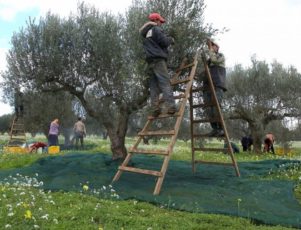The EU has granted Tunisia a 2 year tax break on the import of olive oil; now it is down to the country to make it a top seller.
Producers of olives and olive oil since Roman times, Tunisia has stuck to a tried and tested method of harvesting this ancient fruit. Due to relatively cheap labor still on offer in the country, the olives benefit from being gathered using a technique of gentle sweeping with small rakes by a mostly female workforce.
Said to help retain the flavor of the olives and cause less damage to the trees, handpicking prevails over the commonly adopted method of machine harvesting in Europe. In order to distinguish themselves on the global market, maintaining the best flavor from their olives and being able to confidently ensure a pure product is paramount. “We can say that our bottled oil is 100% Tunisian and that counts for a lot in specialty shops. This is something Italy cannot always guarantee,” said Lemia Thabet, Executive Director of the Tunisian Technical Packaging Centre.
New lease on life for ancestral industry
Tunisia is the biggest producer of olive oil outside of Europe, yet for such a prolific producer the northernmost country in Africa has up until now remained decidedly in the shadows of its European counterparts. It has settled instead for selling off large quantities of oil to rival countries such as Spain, the biggest producer in Europe, and to Italy, commonly thought of as the home of olive oil. The wholesale olive oil is then mixed with the local kind, by way of improving on what will become the big brands we are all familiar with. In this way the “liquid gold” Tunisia produces is generating far less money than if they had the means to bottle, package and label the product on their own.
 On 10th March, 2016, the European Parliament agreed upon an initiative to allow the country to export tax-free olive oil for two years, limited to 35,000 tons per year. The reason for the tax break is in part due to the particularly bountiful spell that Tunisia has been experiencing compared with the rest of the world. Records released by the Tunisian Ministry of Industry, Mines and Energy showed that for the 2014-2015 season, Tunisia exported more than any other country worldwide. In a record-breaking harvest, overseas sales reached 299,300 tons, which equates to a massive 10 percent of the global olive oil consumption. This earned the country, which has a 3,000-year history of olive-farming, a respectable $976 million. “Our record harvest has coincided with a shortfall in international production,” said Abdellatif Ghedira, the head of the government’s National Oil Office. “This year we are the world’s second-largest producer.”
On 10th March, 2016, the European Parliament agreed upon an initiative to allow the country to export tax-free olive oil for two years, limited to 35,000 tons per year. The reason for the tax break is in part due to the particularly bountiful spell that Tunisia has been experiencing compared with the rest of the world. Records released by the Tunisian Ministry of Industry, Mines and Energy showed that for the 2014-2015 season, Tunisia exported more than any other country worldwide. In a record-breaking harvest, overseas sales reached 299,300 tons, which equates to a massive 10 percent of the global olive oil consumption. This earned the country, which has a 3,000-year history of olive-farming, a respectable $976 million. “Our record harvest has coincided with a shortfall in international production,” said Abdellatif Ghedira, the head of the government’s National Oil Office. “This year we are the world’s second-largest producer.”
Olive oil economy
Accounting for over 10 percent of Tunisia’s exports and providing a livelihood for hundreds of thousands of people, it is unquestionable that the olive oil trade is of major importance to the country, coming second to tourism. However, after the devastating effects of 2015’s Bardo Museum terrorist attacks and the Sousse beach massacre, what once was the nation’s linchpin, generating 15 percent of the country’s GDP in 2014, is now a sector worryingly in decline.
Bereft of some one million foreign visitors last year, the economy is in crisis and the security of the nation as well, as the somber climate has given rise to expanding terrorism. Recognizing the terrible blows Tunisia has been dealt over the past year and the promise the country had shown for real democratic change, the EU stepped in. A declaration of political support is the primary reason for implementing the measures, in hopes that it will allow the Tunisian economy enough time to recover. “Exceptional times call for exceptional measures. The proposal is a strong signal of EU solidarity with Tunisia,” said High Representative of the European Union, Federica Mogherini, adding, “Tunisia can count on the EU’s support in such a difficult time.”
Promoting the future
The tax break may come as a temporary relief but other obstacles still lie in the paths of the country’s producers. To truly make a success of this opportunity they first need to contend with a market that is very much geared towards promoting Spanish and Italian olive oil as superior. Also for the most profit to be made the entire production process would have to take place on home turf. “We buy almost all our bottles and stoppers from Italy and that pushes up the price, we should be making our own,” said expert Mounir Ouhrani of Slama Huiles.
While there may be some hurdles along the way, Tunisia can rest assured on the product they have to offer. A country that is covered with 1.7 million hectares of olive trees, almost 20 percent of the olive tree orchards worldwide, they are no small fry. The uniqueness of the olive oil they produce is remarked upon internationally; a particularly rich flavor that due to its high fat content is able to withstand high temperatures while still maintaining its notable nuttiness. Pair this with the traditional way in which the olives are harvested and you have two solid reasons why the North African country could make a successful breakthrough onto the global olive oil market. Given the chance and an audience who are willing to look beyond the norm, olive oil could soon be Tunisia’s number one industry.











